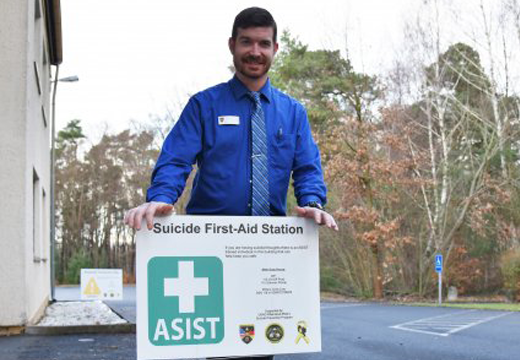Friday, June 16, 2023 | Mary Ann Davis (IMCOM)

KAISERSLAUTERN, Germany -- When you or someone you know demonstrates suicidal ideations, knowing where to turn is critical. That's why the U.S. Army Garrison Rheinland-Pfalz Suicide Prevention Program launched the Suicide First-Aid Station and Keep Safe initiative.
The program kicked off in November and trains suicide prevention gatekeepers and places signs outside of their work locations so people in need of assistance can find them immediately.
"We began the program after realizing how difficult it was to locate the trainees after they finished the courses," said Yancy Chandler, U.S. Army Garrison Rheinland-Pfalz Suicide Prevention Program manager. "As a trainer, I knew what organizations had trained personnel, but I didn't know their exact locations -- and if it was difficult for me to find them, then it may be difficult for those who had thoughts of suicide to find trained caregivers as well."
The initiative supports the garrison commander's primary concern of taking care of Soldiers, civilians and families, Chandler said, and offers additional assistance for community members that may be going through a crisis. By providing this additional layer of support, the garrison can keep community members mission ready and focused on the tasks at hand.
"The role of Suicide First-Aid Stations is to support individuals having suicidal thoughts and create a 'stay-safe-for-now plan' until further help can be provided. To become a Suicide First-Aid Station, individuals must complete the two-day Applied Suicide Intervention Skills Training (ASIST)," Chandler explained. "Keepsafe Connection Sites support individuals with suicidal thoughts and connects them to resources to keep them safe. To become a part of a Keepsafe Connection Site program, individuals must complete the four-hour safeTALK session."
According to LivingWorks Education, ASIST is an interactive workshop in suicide first-aid, teaching participants to recognize when someone may be at risk of suicide and work with them to create a plan that will support their immediate safety. Although ASIST is widely used by healthcare providers, it can be learned and used by anyone.
safeTALK helps participants become alert to suicide. Suicide-alert people are better prepared to connect those with thoughts of suicide with life-affirming help. Over the course of their training, safeTALK participants will learn to:
• Notice and respond to situations where suicide thoughts may be present,
• Recognize that invitations for help are often overlooked,
• Move beyond the common tendency to miss, dismiss, and avoid suicide,
• Apply the TALK steps: Tell, Ask, Listen, KeepSafe; and
• Know community resources and how to connect someone with thoughts of suicide to them for further help.
Heather Baral, a Prevention coordinator and Employee Assistance Program coordinator with the Army Substance Abuse Program at Baumholder, said she attended both courses because she is very passionate about helping Soldiers, family members and civilians, and the ASIST training provided valuable tools to positively influence them.
"This training was by far one of the most rigorous trainings I have received; the instructors expected quality work from the trainer-candidates and, as a result, there were a lot of late night study sessions," she said. "This benefited us since we became familiar with the material and more comfortable in providing this meaningful training to participants. I am passionate about the ASIST program and how it keeps people with thoughts of suicide safe for now, and it's reassuring to know that my training has prepared me for handling these difficult situations where someone is having thoughts of suicide."
Chandler's goal is to have multiple stations and sites across the garrison to support those who are at risk of suicide.
"The ASIST and safeTALK programs offer caregivers so many tools to support someone in crisis. Currently, we trained more than 300 garrison community members in these programs," he said. "The great thing is that you do not need any prior training to attend these workshops. At each workshop that I've taught, at least one or two participants have said they wished they had this training in the past."
The two courses prepare caregivers to be aware and to speak openly and comfortably about the topic of suicide, because no one knows when it may be needed, Baral said.
"I had a situation where a participant in one of my substance abuse classes was struggling. My gut instinct told me something was out of sorts when the participant asked if he could speak with me after class. Upon listening to the Soldier's story, I learned that he had thoughts of suicide and needed someone to hear his story," she explained. "Based on my ASIST training, I knew exactly how to respond and provided a listening ear as the Soldier explained his difficult situation. ASIST provides a structured framework which can be followed to keep the person safe for now. My training kicked in, and I was able to provide the necessary resources by connecting the Soldier to the appropriate resources."
To learn more or sign up for ASIST or safeTALK training, call Chandler at DSN 493-4901 or commercial at 0631-3406-4901.
